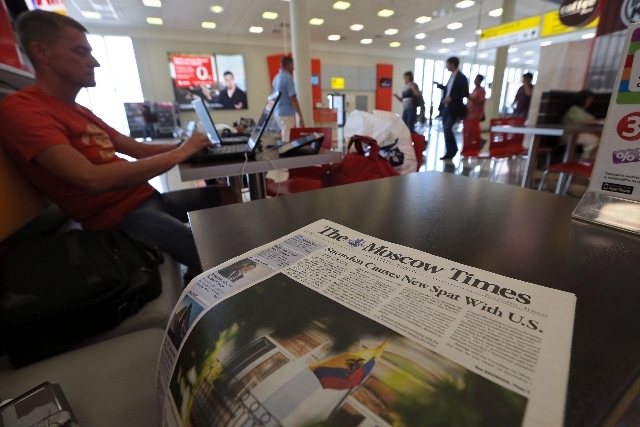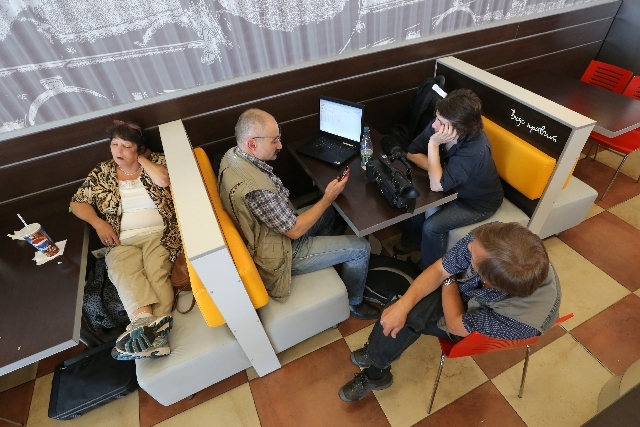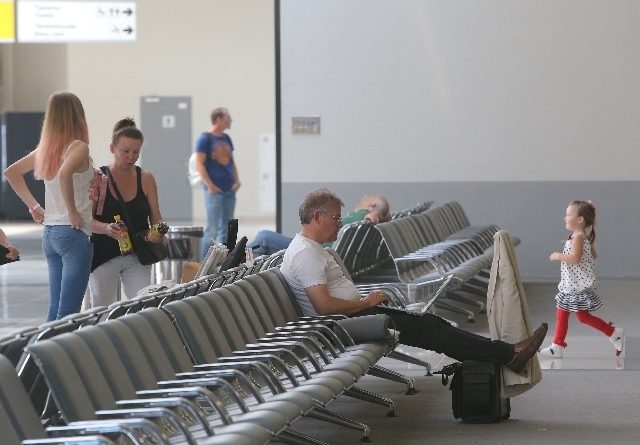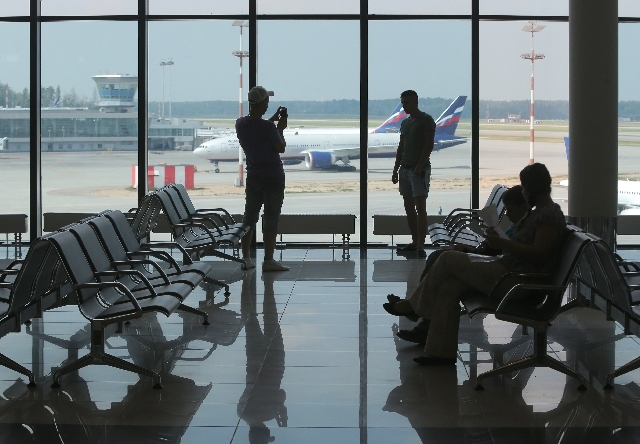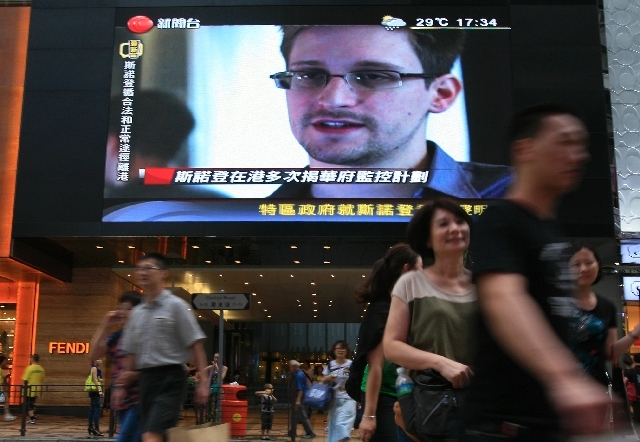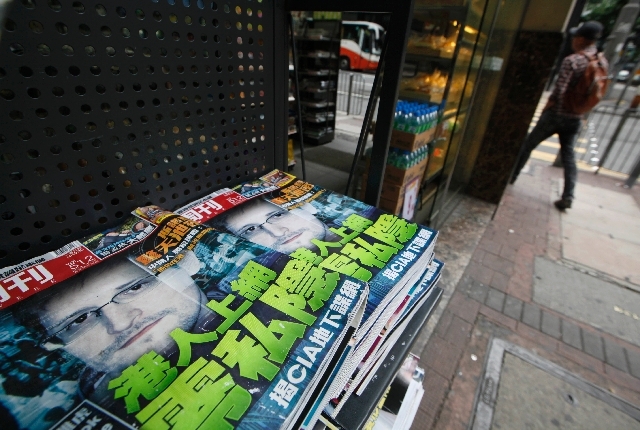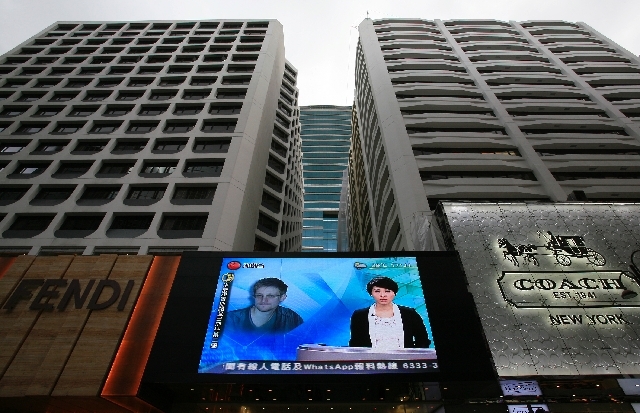Snowden mystery deepens: All eyes on airport
MOSCOW — Moscow’s main airport swarmed with media from around the globe Wednesday, but the man they were looking for — National Security Agency leaker Edward Snowden — was nowhere to be seen. The mystery of the former spy’s whereabouts only deepened a day after President Vladimir Putin said that Snowden was in the transit area of Sheremetyevo Airport.
An Associated Press reporter entered the area Wednesday by flying from Kiev, Ukraine, and found ordinary scenes of duty free shopping, snoozing travelers and tourists sipping coffee, but no trace of America’s most famous fugitive. If Putin’s statement is true, it means that Snowden has effectively lived a life of airport limbo since his weekend flight from Hong Kong, especially with his American passport now revoked by U.S. authorities.
In a further twist, Ecuador’s foreign minister said Wednesday it could take months to decide whether to grant asylum to Snowden and the Latin American nation would need to take into consideration its relations with the U.S. when doing so. Speaking during a visit to Malaysia’s main city, Kuala Lumpur, Ricardo Patino compared Snowden’s case to that of Julian Assange, the founder of anti-secrecy group WikiLeaks, who has been given asylum in the Ecuadorean Embassy in London.
“It took us two months to make a decision in the case of Assange, so do not expect us to make a decision sooner this time,” Patino told reporters.
Snowden, who is charged with violating American espionage laws, fled Hong Kong over the weekend and flew to Russia. He booked a seat on a Havana-bound flight Monday en route to Venezuela, but didn’t board the plane. His ultimate destination was believed to be asylum in Ecuador.
The airport zone where Snowden is purportedly staying serves both connecting passengers traveling via Moscow to onward destinations and passengers departing from Moscow who have passed border and security checks.
The huge area unites three terminals: the modern, recently built D and E, and the older, less comfortable F, which dates to the Soviet era. The transit and departure area is essentially a long corridor, with boarding gates on one side and gleaming duty free shops, luxury clothing boutiques and souvenir stores selling Russian Matryoshka dolls on the other. About a dozen restaurants owned by local and foreign chains serve various tastes.
Hundreds of Russian and foreign tourists awaited flights here, some stretched out on rows of gray chairs, others sipping hot drinks at coffee shops or looking out through giant windows as silver-blue Aeroflot planes land and take off.
Business ran as usual at the terminals on Wednesday morning. An Asian girl, about 10 years old, slept peacefully on her father’s lap. A middle-aged mother and her teenage daughter tried out perfume samples at a duty free store, while nearby a woman in a green dress picked out a pair of designer sunglasses. A pilot was buying lunch at Burger King.
Putin insisted Tuesday that Snowden has stayed in the transit zone without passing Russian immigration and is free to travel wherever he likes. But the U.S. move to annul Snowden’s passport may have severely complicated his travel plans. Exiting the transit area would either require boarding a plane or passing through border control. Both require a valid passport or other identification.
Hordes of journalists armed with laptops and photo and video cameras have camped in and around the airport, looking for Snowden or anyone who may have seen or talked to him. But after talking to passengers, airport personnel, waiters and shop clerks, the press corps has discovered no sign of the leaker.
Russian news agencies, citing unidentified sources, reported that Snowden was staying at a hotel in the transit terminal, but he was not seen at the zone’s only hotel, called “Air Express.” It offers several dozen capsule-style spaces that passengers can rent for a few hours to catch some sleep. Hotel staff refused to say whether Snowden was or has in the past stayed there.
“We only saw lots of journalists, that’s for sure,” said Maxim, a waiter at the Shokoladnitsa diner not far from Air Express. He declined to give his last name because he wasn’t allowed to talk to reporters.
The departure and transit area is huge and has dozens of small rooms, some labeled “authorized personnel only,” where one could potentially seek refuge with support from airport staff or security personnel. And security forces or police patrolling the area can easily whisk a person out of this area though back doors or corridors.
There are also a few VIP lounge areas, accessible to business-class passengers or people willing to pay some $20 per hour. Snowden was not seen in those areas.
Sheremetyevo’s press service declined to comment on Snowden’s whereabouts. A policeman at the airport laughed off a question from an AP reporter about Snowden’s whereabouts. “Journalists have searched this place for three days and have found nothing. Was he ever here in the first place?” the policeman asked. He spoke to the Associated Press on condition of anonymity, because he was not authorized to talk to the media.
Meanwhile, WikiLeaks gave a terse update on Snowden’s condition earlier on Wednesday, saying in a statement posted to Twitter that Snowden was “well.”
WikiLeaks says that one of its staffers, Sarah Harrison, was traveling with Snowden, but the statement gave no indication if the update came from her, from Snowden, or from some other source.
WikiLeaks spokesman Kristinn Hrafnsson did not immediately return a call and a text seeking further comment.
In a conference with reporters on Monday, Assange said that he was limited in what he could say about Snowden due to security concerns. He denied reports that Snowden was spending his time at the airport being debriefed by Russian intelligence officers.
In another development, Spanish judge Baltasar Garzon said Wednesday that he had decided not to represent the leaker. A statement from his law firm provided no further explanation.
Garzon, who has fought on WikiLeaks’ behalf, became famous for indicting former Chilean dictator Augusto Pinochet in 1998 and trying to put him on trial for crimes against humanity. He was suspended from office in Spain for overstepping his powers by starting an investigation into killings committed on behalf of former Spanish dictator Gen. Francisco Franco.
—————
Yoong reported from Kuala Lumpur. Lynn Berry in Moscow and Raphael Satter in London contributed to this report.



